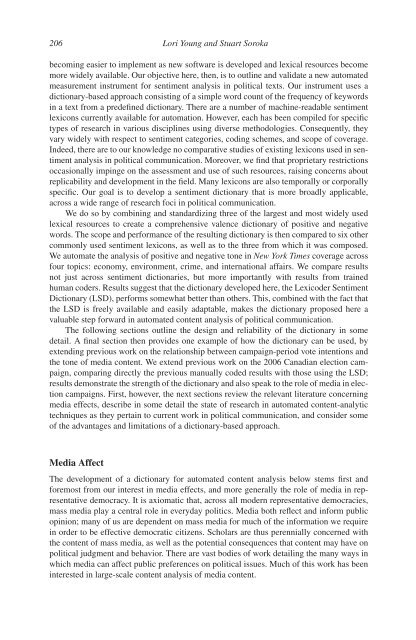Affective News: The Automated Coding of Sentiment ... - Stuart Soroka
Affective News: The Automated Coding of Sentiment ... - Stuart Soroka
Affective News: The Automated Coding of Sentiment ... - Stuart Soroka
Create successful ePaper yourself
Turn your PDF publications into a flip-book with our unique Google optimized e-Paper software.
206 Lori Young and <strong>Stuart</strong> <strong>Soroka</strong><br />
becoming easier to implement as new s<strong>of</strong>tware is developed and lexical resources become<br />
more widely available. Our objective here, then, is to outline and validate a new automated<br />
measurement instrument for sentiment analysis in political texts. Our instrument uses a<br />
dictionary-based approach consisting <strong>of</strong> a simple word count <strong>of</strong> the frequency <strong>of</strong> keywords<br />
in a text from a predefined dictionary. <strong>The</strong>re are a number <strong>of</strong> machine-readable sentiment<br />
lexicons currently available for automation. However, each has been compiled for specific<br />
types <strong>of</strong> research in various disciplines using diverse methodologies. Consequently, they<br />
vary widely with respect to sentiment categories, coding schemes, and scope <strong>of</strong> coverage.<br />
Indeed, there are to our knowledge no comparative studies <strong>of</strong> existing lexicons used in sentiment<br />
analysis in political communication. Moreover, we find that proprietary restrictions<br />
occasionally impinge on the assessment and use <strong>of</strong> such resources, raising concerns about<br />
replicability and development in the field. Many lexicons are also temporally or corporally<br />
specific. Our goal is to develop a sentiment dictionary that is more broadly applicable,<br />
across a wide range <strong>of</strong> research foci in political communication.<br />
We do so by combining and standardizing three <strong>of</strong> the largest and most widely used<br />
lexical resources to create a comprehensive valence dictionary <strong>of</strong> positive and negative<br />
words. <strong>The</strong> scope and performance <strong>of</strong> the resulting dictionary is then compared to six other<br />
commonly used sentiment lexicons, as well as to the three from which it was composed.<br />
We automate the analysis <strong>of</strong> positive and negative tone in New York Times coverage across<br />
four topics: economy, environment, crime, and international affairs. We compare results<br />
not just across sentiment dictionaries, but more importantly with results from trained<br />
human coders. Results suggest that the dictionary developed here, the Lexicoder <strong>Sentiment</strong><br />
Dictionary (LSD), performs somewhat better than others. This, combined with the fact that<br />
the LSD is freely available and easily adaptable, makes the dictionary proposed here a<br />
valuable step forward in automated content analysis <strong>of</strong> political communication.<br />
<strong>The</strong> following sections outline the design and reliability <strong>of</strong> the dictionary in some<br />
detail. A final section then provides one example <strong>of</strong> how the dictionary can be used, by<br />
extending previous work on the relationship between campaign-period vote intentions and<br />
the tone <strong>of</strong> media content. We extend previous work on the 2006 Canadian election campaign,<br />
comparing directly the previous manually coded results with those using the LSD;<br />
results demonstrate the strength <strong>of</strong> the dictionary and also speak to the role <strong>of</strong> media in election<br />
campaigns. First, however, the next sections review the relevant literature concerning<br />
media effects, describe in some detail the state <strong>of</strong> research in automated content-analytic<br />
techniques as they pertain to current work in political communication, and consider some<br />
<strong>of</strong> the advantages and limitations <strong>of</strong> a dictionary-based approach.<br />
Media Affect<br />
<strong>The</strong> development <strong>of</strong> a dictionary for automated content analysis below stems first and<br />
foremost from our interest in media effects, and more generally the role <strong>of</strong> media in representative<br />
democracy. It is axiomatic that, across all modern representative democracies,<br />
mass media play a central role in everyday politics. Media both reflect and inform public<br />
opinion; many <strong>of</strong> us are dependent on mass media for much <strong>of</strong> the information we require<br />
in order to be effective democratic citizens. Scholars are thus perennially concerned with<br />
the content <strong>of</strong> mass media, as well as the potential consequences that content may have on<br />
political judgment and behavior. <strong>The</strong>re are vast bodies <strong>of</strong> work detailing the many ways in<br />
which media can affect public preferences on political issues. Much <strong>of</strong> this work has been<br />
interested in large-scale content analysis <strong>of</strong> media content.


